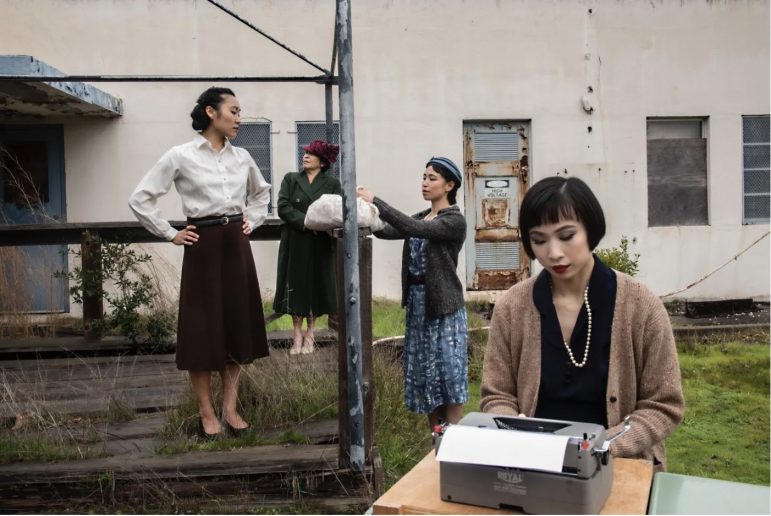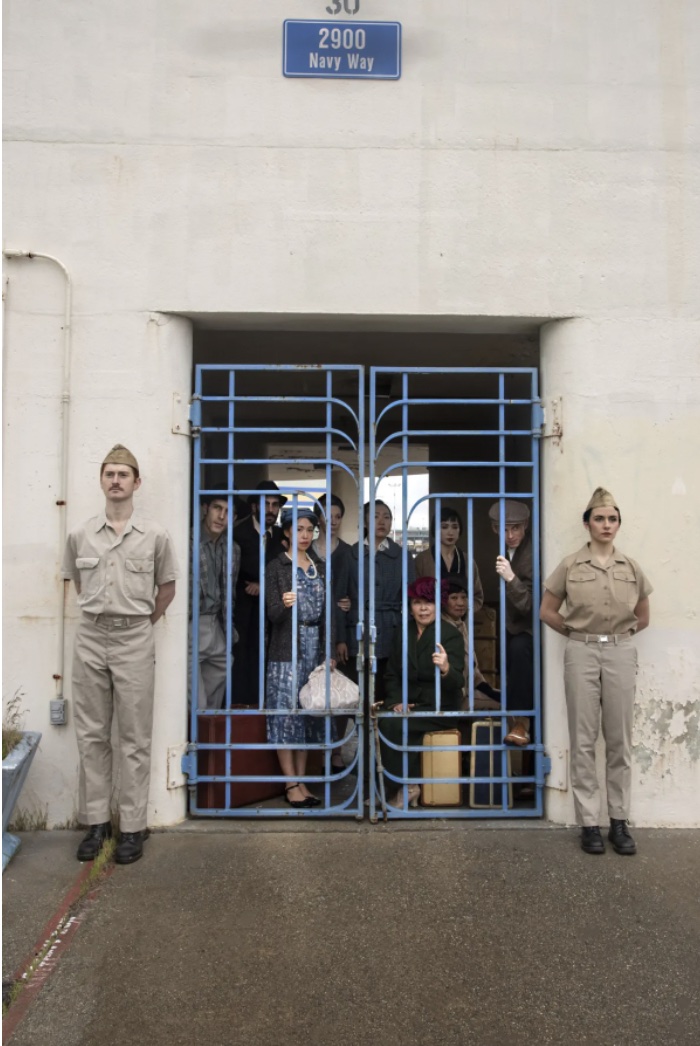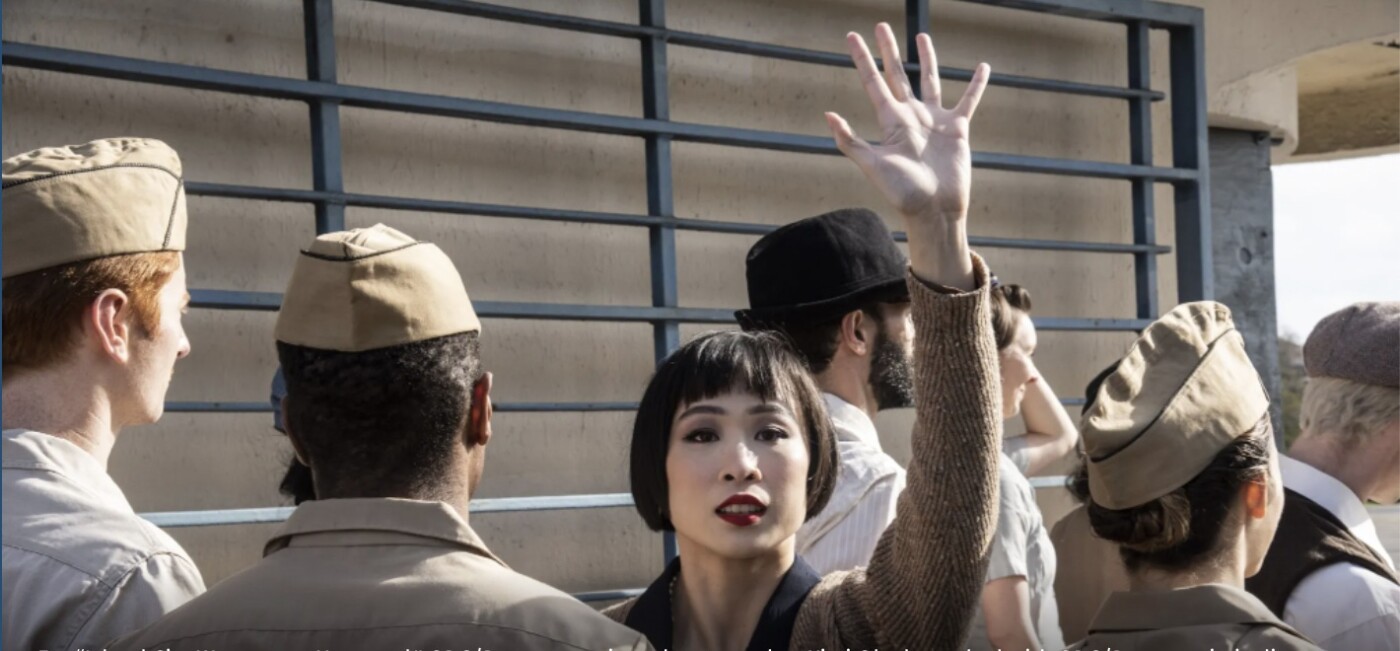The stage — specifically, former Naval Air Station Alameda — is set for a one-of-a-kind show this upcoming weekend, “Island City Waterways: Uprooted.”
After a two-year hiatus, this popular, free-of-cost outdoor event celebrating the history of the Alameda waterfront returns to the East Bay island on Saturday and Sunday.
Presented by the community-based arts center Rhythmix Cultural Works in partnership with the City of Alameda, “Island City Waterways 2022” explores the concept of being uprooted — with a specific tie-in to the history of Alameda’s NAS as an aircraft and pilot hub, military base and “civil control station” where Japanese Americans were ordered to report before being sent to World War II internment camps.
Says Janet Koike, Rhythmix’s founder and creative director, “They’re all stories of being uprooted — uprooted to fly, [as with] the first pilots, [and] uprooted by war, either by the industry of war, by becoming a soldier, by being drafted or by being politically targeted.”
The historical and cultural significance of Alameda’s NAS, now referred to as Alameda Point, will be focused on and honored via immersive dance, music and theatrical performances from 13th Floor Theater, Akira Tana Trio, Maze Daiko world music ensemble and ODC/Dance.
Kimi Okada is the associate choreographer at San Francisco’s ODC/Dance, and she co-choreographed “Uprooted” with Brenda Way, ODC/Dance founder and artistic director. Okada explains that when Koike approached her with the idea of using the former Alameda military base as the location and “uprooted” as the theme, she had an identifiable personal connection to Koike’s proposal: “For me, it was an amazing opportunity to be able to use my own archives of personal family history.”

Those archives are Okada’s mother’s detailed letters to friends and family that she had written during World War II. Says Okada of her mother, “She had an old Underwood typewriter, and she had carbon copies on onionskin paper of every single letter that she ever wrote from [the] relocation camp and the holding center where the Japanese Americans were put before they actually went to the internment camps.”
Prior to internment, Okada’s mother had worked as a civil servant and thus had what Okada describes as sort of a secretary mentality. According to Okada, her mother didn’t really talk about the internment experience when she was alive — it wasn’t that she kept it hidden, explains Okada, but she was very matter-of-fact about it.

As Okada comments, “I didn’t really realize the extent to which their liberties were taken away until much later, because my mother didn’t talk about it as being a huge time of racism and injustice. She talked about what it was like to cope every day; it was from a very personal point of view.”
Okada’s mother and father married only a short time prior to Franklin D. Roosevelt’s Executive Order 9066, a 1942 directive that forced Japanese individuals — her parents included — to go to relocation centers.
On developing the piece for “Uprooted,” Okada notes that it involved capturing what her parents went through during that time. As she says, “They were married for two weeks and were suddenly in a fishbowl with no privacy. What did they do every day? How did they deal with that? How did they develop an intimate relationship? What was it like to be with all of their other family members and squabbling with everybody? I mean, there’s so many allusions to what daily life was like with not only close family members but with thousands of people that were at camp.”
For Okada, creating “Uprooted” based on her mother’s letters was an opportunity to tell her version of her parents’ story, with the aim to capture the spirit, the ethos and what they might have gone through emotionally.
She shares, “I have a huge loose leaf notebook full of letters from my mother to various people describing daily life in the camps and what they were thinking and everything from how they had to stand in lines to no privacy in the commode and the showers to what they did to entertain themselves. Really, it was an incredible documentation of the daily life of what it was like to actually be in these internment camps.”
Koike notes that the personal story of Okada’s parents — and her application of such for the “Uprooted” piece — also convey a cultural, and correspondingly larger, story.

Says Koike, “[Her mother’s] response was not that unusual for Japanese Americans. Yes, there were people who outwardly objected, as they certainly had a right to, but as a cultural response after the war, it seemed that there was a larger percent[age] of people who wanted to put their head down and just try to make a life for themselves. They didn’t want to talk about this. My parents also did not want to talk about it. And I don’t think they wanted to carry around that miserable memory with them so much; they wanted to move forward.”
This weekend’s event draws attention to those culturally significant personal experiences of Japanese Americans during the 20th century, while also touching upon the importance of community, the more general, far-reaching circumstances of racial discriminaton and injustice — and the notion of resilience.
Says Okada, “I’m trying to capture that feeling of ‘This is what life has dealt us. This is how we’re gonna get through this.’ That’s really, for me, what the emotional center and impetus is for making this piece that sits inside this much bigger context.”
“Island City Waterways: Uprooted” takes place at 10 a.m., 11:45 a.m., 1:30 p.m. and 3:15 p.m. Saturday and Sunday at Alameda Point’s West Mall Square. ASL interpretation will be provided at all of the Sunday shows. The all-ages show is free, but an RSVP is required. For tickets and information, visit https://www.islandcitywaterways.org/.
